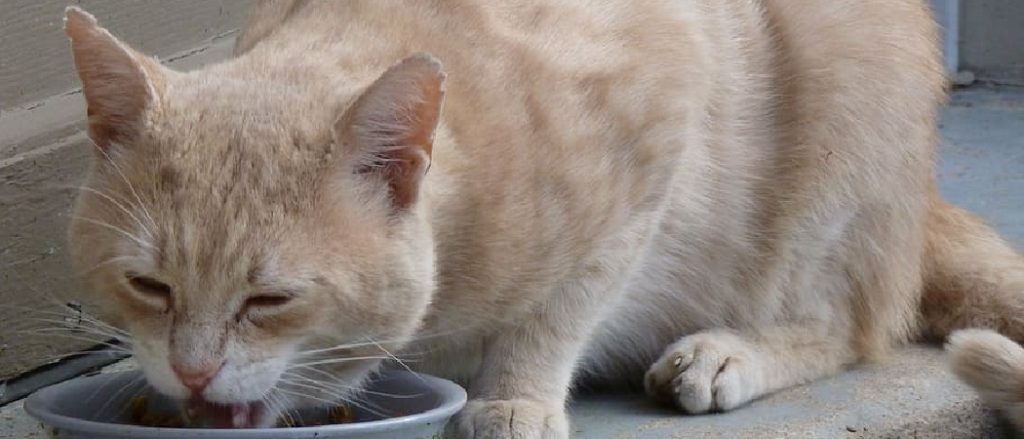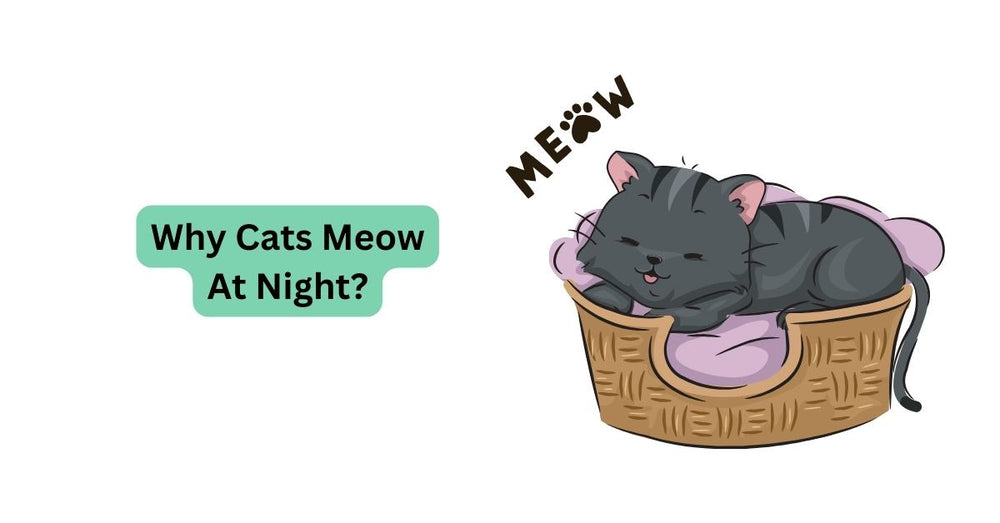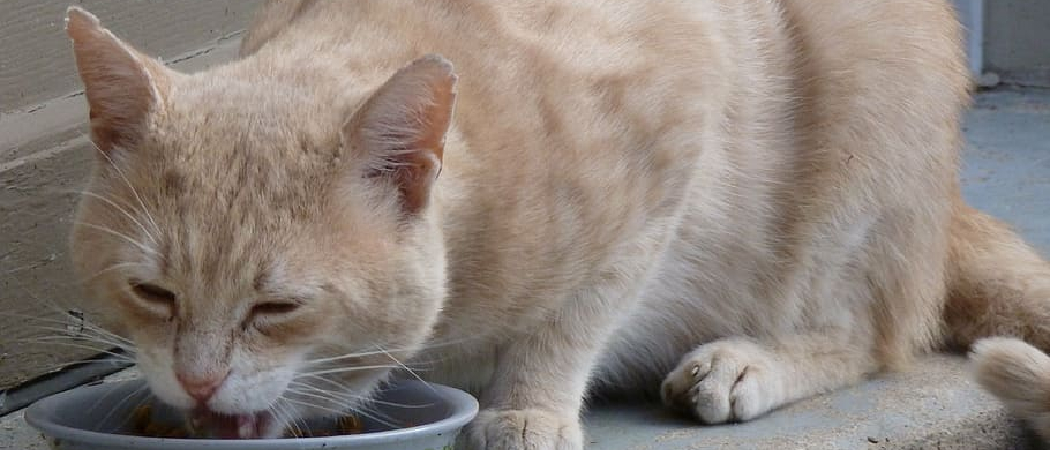Cats may yowl after eating due to food allergies or a behavioral issue like seeking attention. Every cat owner has likely experienced their feline companion yowling after a meal.

This behavior can be puzzling, leaving owners wondering why their cat engages in such vocalization. There are a few potential explanations for this post-meal yowling. One possibility is that the cat is experiencing discomfort from food allergies or sensitivity, leading to a vocal expression of this discomfort.
Another reason could be a behavioral issue, with the cat yowling as a means of seeking attention or expressing dissatisfaction. Understanding the reasons behind this behavior can help cat owners address their pet’s needs and provide appropriate care. We will explore the potential causes of post-meal yowling in cats and discuss ways to manage or prevent this behavior.

Credit: mywaggle.com
Understanding Cat Behavior
Understanding the behavior of our beloved feline friends is vital for their overall well-being and happiness. Cats communicate in different ways, and one of the ways they express themselves is through vocalizations. Whether it’s a purr, a hiss, or a yowl, each vocalization has a specific meaning. In this blog post, we’ll explore the intriguing world of cat behavior and shed light on why your cat may yowl after eating.
Cats have a wide range of vocalizations, each with its own purpose and meaning. Let’s take a closer look at some common vocalizations and what they signify:
| Vocalization | Meaning |
|---|---|
| Purr | Contentment, happiness, relaxation |
| Hiss | Warning, aggression, fear |
| Meow | Communication with humans, various meanings depending on tone and context |
| Yowl | Various meanings, including hunger, distress, mating behavior, or medical issues |
As you can see, a yowl can have multiple interpretations, making it essential to decode your cat’s specific behavior and context to understand why they are yowling after their meal.
It’s important to note that yowling, after eating or at any other time, shouldn’t be ignored. Your cat may be trying to communicate something important, and it’s your role as a responsible pet owner to investigate and address their needs.
If you notice that your cat consistently yowls after eating, it’s crucial to rule out any essential medical issues by consulting with a veterinarian. They can examine your cat and determine if there are any underlying health problems contributing to the behavior.
Once any potential medical conditions have been ruled out, you can start observing your cat’s behavior patterns and environment to gain further insight into why they yowl after eating. Are there any changes in their routine, diet, or surroundings that may be causing them distress?
It’s also possible that your cat simply enjoys vocalizing and using their voice to communicate with you. Some cats may yowl after eating purely out of excitement or as a way to grab your attention. They might associate their mealtime with the opportunity to vocalize and get your interaction.
Understanding cat behavior can be a fascinating journey, as it allows us to create a stronger bond with our furry companions. When your cat yowls after eating, it could be an expression of hunger, distress, or even a desire for attention. By closely observing your cat’s behavior, consulting with a veterinarian, and ensuring their physical and emotional needs are met, you can create a harmonious environment and address any underlying issues that may be causing the yowling. Remember, every cat is unique, and their vocalizations are their way of communicating with us, so let’s listen and respond with care.
:format(jpeg):quality(75))
Credit: manypets.com
Reasons Behind Yowling After Eating
Cats may yowl after eating due to various reasons, such as seeking attention, expressing discomfort or pain, or displaying territorial behavior. Understanding the underlying causes can help address and manage this behavior effectively.
Reasons Behind Yowling After Eating: Hunger and Food Excitement When it comes to our feline friends, their behavior can often be enigmatic. One such puzzling behavior is yowling after eating. While it may seem odd, there are several reasons why your cat may yowl after a meal. Let’s explore them in detail below. Hunger is one of the primary reasons behind your cat’s yowling after eating. Cats are natural hunters, and their instincts drive them to eat small meals frequently throughout the day. So, if your cat finishes its meal quickly and still craves more food, hunger may be the source of its vocalization. This behavior can be more prevalent in cats who have restricted access to food or are on a diet. Food excitement is another factor that can contribute to your cat’s yowling after eating. Just like how some humans become excited or vocal when they’re about to eat their favorite dish, cats can display similar behavior. If your cat is particularly enthusiastic about its meals, it may express its excitement through yowling. This behavior is more likely to happen in younger cats or cats that have a high energy level. Medical Issues In some cases, yowling after eating can be a sign of medical issues affecting your cat’s digestive system. It’s essential to be aware of any accompanying symptoms and consult with your veterinarian if you suspect any health problems. Some possible medical reasons for yowling after eating may include: 1. Dental Pain: Cats with dental issues, such as tooth decay or gum disease, can experience discomfort or pain while eating. As a result, they may yowl after their meals to express their distress. 2. Gastrointestinal Disorders: Conditions like gastroenteritis or pancreatitis can cause abdominal discomfort and pain. Your cat may yowl after eating as a response to this discomfort. 3. Urinary Tract Problems: Cats with urinary tract infections or crystals in their urine might experience pain or discomfort during or after eating. This discomfort can lead to yowling. Behavioral Reasons In addition to hunger and medical issues, there are several behavioral reasons that may contribute to your cat’s yowling after eating. Let’s explore a few possible behavioral causes: 1. Attention Seeking: Cats are known for their ability to demand attention. If your cat notices that yowling after eating gets a response from you, it may continue this behavior as a way to get your attention or be rewarded with extra food. 2. Anxiety or Stress: Cats can experience anxiety or stress from various factors, such as changes in their environment, new additions to the family, or even changes in routine. Yowling after eating can be a manifestation of their anxiety or stress. 3. Aging and Cognitive Decline: Older cats may yowl after eating due to cognitive decline. Conditions like feline cognitive dysfunction syndrome (similar to Alzheimer’s disease in humans) can cause disorientation and confusion, leading to yowling after meals. It’s important to carefully observe your cat’s behavior and consider the potential reasons behind its yowling after eating. If you suspect any medical issues or persistent behavioral problems, consult with your veterinarian for a proper diagnosis and guidance. In conclusion, yowling after eating in cats can occur due to hunger, food excitement, medical issues, or behavioral reasons. Understanding the underlying cause can help you address the behavior appropriately and ensure your cat’s well-being.
Addressing Yowling Behavior
Addressing yowling behavior in cats is essential to ensure their health and well-being. If you’ve noticed your furry friend yowling after eating, there are several steps you can take to address this behavior. From ensuring adequate feeding to consulting a veterinarian, creating a calm feeding environment, and incorporating behavioral modification techniques, these strategies can help alleviate yowling and promote a more peaceful mealtime for both you and your cat.
Ensure Adequate Feeding
One of the first steps in addressing yowling behavior after eating is to ensure that your cat is being adequately fed. Cats may yowl if they are still hungry or if they feel unsatisfied with their meal. Take note of the amount and type of food you are providing and consider following these tips:
- Divide the daily food portion into multiple small meals throughout the day. This approach not only helps prevent overeating but also provides a sense of satisfaction for your cat.
- Check the feeding guidelines on the pet food packaging to determine the appropriate amount of food for your cat’s age, weight, and activity level. Adjust the portion size accordingly.
- Consider incorporating interactive feeding toys or puzzles to engage your cat during mealtime. This not only adds mental stimulation but can also help slow down their eating pace.
Consulting A Veterinarian
If your cat’s yowling behavior persists despite ensuring adequate feeding, it may be beneficial to consult a veterinarian. Yowling after eating could be a sign of an underlying medical condition or discomfort. A vet can examine your cat and perform necessary tests to rule out any health issues. They may also provide specific dietary recommendations or prescribe medication, if required.
Creating A Calm Feeding Environment
The environment in which your cat eats can greatly influence their behavior. Creating a calm and stress-free feeding environment can help reduce yowling. Consider the following tips:
- Designate a quiet area where your cat can eat without distractions such as loud noises or other pets.
- Use non-slip food bowls to prevent them from sliding around, which can cause anxiety and discomfort.
- Ensure the feeding area is clean and hygienic. Cats are sensitive to odors, and a dirty feeding area may contribute to their stress levels.
Behavioral Modification Techniques
If your cat’s yowling behavior is not due to hunger or a medical issue, it may be necessary to implement behavioral modification techniques. These techniques can help redirect their behavior and create positive associations with mealtime. Here are some strategies to consider:
- Ignore the yowling behavior: Avoid reinforcing the yowling by providing attention or food when your cat vocalizes. Wait for them to be quiet before offering treats or affection.
- Reward quiet behavior: When your cat remains calm and quiet during and after meals, offer verbal praise, treats, or playtime as a positive reinforcement.
- Provide mental and physical stimulation: Engage your cat in regular play sessions, provide interactive toys, and dedicate time for cuddling and socialization. This helps expend their energy and reduces restlessness or boredom.
By combining these strategies and consistently addressing yowling behavior after eating, you can create a more harmonious mealtime routine for both you and your cat. Remember, patience and consistency are key when dealing with behavioral issues, and always consult a veterinarian if you have concerns about your cat’s health or well-being.

Credit: www.amazon.com
Frequently Asked Questions On Why Does My Cat Yowl After Eating
Why Does My Cat Yowl After Eating?
Cats may yowl after eating due to a variety of reasons, such as food allergies, dental issues, or simply wanting attention. It’s important to observe their behavior and consult with a veterinarian to determine the underlying cause and provide appropriate care.
How Can I Stop My Cat From Yowling After Eating?
To stop your cat from yowling after eating, ensure they’re receiving a balanced and appropriate diet, with proper portion sizes. Additionally, address any potential health issues and provide mental and physical stimulation to keep them entertained and satisfied.
Is Yowling After Eating A Sign Of A Medical Condition?
Yowling after eating may be a sign of an underlying medical condition, such as gastrointestinal problems or pain. If your cat consistently displays this behavior, it’s essential to consult with a veterinarian to rule out any health issues and to provide necessary treatment if needed.
Conclusion
After analyzing various reasons, it is clear that a yowling cat after eating can indicate underlying issues. From dental problems to gastrointestinal discomfort or even feeling unsatisfied with their meal, cats communicate their needs through vocalization. As responsible pet owners, it is essential to observe their behavior, consult a veterinarian if necessary, and provide proper care to ensure their overall well-being.
By understanding the reasons behind their yowling, we can better address their needs and foster a harmonious bond with our feline companions.


